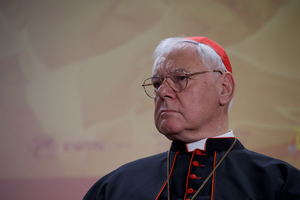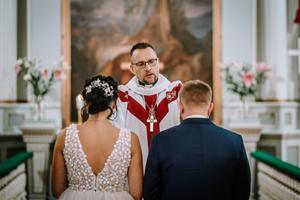Register Radio - Synod Recap and Rule of St. Benedict in an Inner City School
, Jeanette De Melo and the Register's Rome Correspondent Edward Pentin recap synod on the family highlights and take a look forward in the Pope's schedule; and in the show's second half, Dan Burke talks with Register writer Tom McDonald about The Rule, a film the work of Benedictine fathers in a Newark inner city school.
Synod Recap with Edward Pentin
Edward Pentin began reporting on the Pope and the Vatican with Vatican Radio before moving on to become the Rome correspondent for the National Catholic Register. Today he’ll discuss highlights from the Extraordinary Synod of Bishops on the Family, just concluded at the Vatican.
The Pope “gave a very interesting and very well-praised recap of how, in these kinds of discussions, one must avoid different sorts of temptations, and he lists them all: temptations to too much rigidity but, on the other hand, too much looseness and looking at things too rosily and various other temptations, like coming down from the cross and not really getting to the issue at hand.”
“The purpose of a synod is primarily to bring unity between the Pope and the bishops,” Pentin said. He mentioned that the Pope “played down” the discussion of division; “he said we had robust debates, really, but it was all part of the synodal approach and it was all necessary to come to a conclusion.”
The Pope’s point was that the synodal process should never be the source of the confusion and discord. So while there was disagreement, the synod shouldn’t be the source of it, and the Pope seemed pleased that it was not.
There were two major aspects that struck Pentin as unusual as a journalist covering the synod. He has covered five different synods, and this synod was definitely more contentious and impassioned than the others. “It was more like a political arena than like something from the Church,” he said. “You’re bringing in a lot of the culture wars” into the synodal approach, and that’s going to impact the approach.
Pentin pointed out that this synod was managed more from the top-down and steered in a certain direction than the other synods he has covered. “Certainly those in the secretariat had a certain vision, and they wanted to pursue that, and they used certain mechanisms to ensure that happened,” he said. He also referenced his piece from last week, “Evidence Emerges of an Engineered Synod.”
Pentin interviewed Cardinal Kasper, Cardinal Burke, and Archbishop Kurtz about the synod, and these interviews will appear soon online, as well as in the upcoming print edition of the Register, which will also include a symposium on the synod.
On Monday, there was a consistory in Rome, originally planned to announce the canonizations but was extended to discuss the Church in the Middle East. “Basically, it was a reaffirmation of the Church’s support for persecuted Christians in the Middle East, but also had cause for greater response from the international community and really calling on the faithful not to be indifferent to the status of persecuted Christians in the Middle East.”
Pentin also shared about the Pope’s visit to Turkey November 28-30.
Listen to the entire interview online or on your mp3 player.
Rule of St. Benedict in an Inner City School with Thomas McDonald
Thomas McDonald is a catechist for the Diocese of Trenton New Jersey and contributes to many Catholic publications. He blogs at www.godandthemachine.com. Thomas has some exciting news about a new film shot in an inner city school in Newark.
In “Playing by ‘The Rule’,” McDonald wrote for the Register about a new documentary, “The Rule,” that chronicles a Benedictine success at a Newark prep school. The story begins with a community devastated by racial unrest and lack of justice. Out of the ashes of a currently failing school system rises this wonderful Benedictine work.
A large number of the monks — 14 — left, but a number of them, many of whom were educated there and felt they could make a positive difference, stayed. It was like a war zone, McDonald said, and they “though this was just where they needed to be.”
The school closed for a short time, and when it reopened, in 1974, “they really tried to serve that community and it was quite extraordinary,” McDonald said.
This movie grew out of a previous award-winning documentary covering the riots in Newark, done by Jerome and Marylou Bongiornos. After the time they spent there, interviewing and talking with people, “they got this picture of this oasis in the middle of Newark, where it’s really quite extraordinary,” McDonald said. “It’s open 24 hours a day, seven days a week, and people are always coming and going, because there are sixty full-time residents.”
“The film shows how all of this comes together to make this kind of a miracle in the middle of Newark,” according to McDonald.
Bringing the kids into a stable environment is really just the beginning of the work St. Benedict Prep does and how it achieves a nearly 100% college acceptance rate for its students. McDonald said that, in the monks who run St. Benedict’s, you can really sense the love that motivates the work.
“I think the success, frankly, is divine in origin,” McDonald said, “I think it’s the Holy Spirit working through these men and on these young men.”
McDonald said that, in terms of practical application and applying the monks’ techniques to other areas, he got a variety of answers. “Basically, the school is very much like Boy Scouts; it’s very much boy-led and it’s all boys.”
McDonald explained how the boys are broken up into smaller groups that are part of larger groups. There’s an accountability of students to students. “What Benedict’s has done, what I think is very core to this achievement, is this level of accountability that they demand in the sense that the man is responsible for the man next to him, his brother.”
“I think the core of it is that formation of men [that St. Benedict’s uses], and we just don’t see that in society,” McDonald said.
Listen to this week’s show online or on your mp3 player.

















